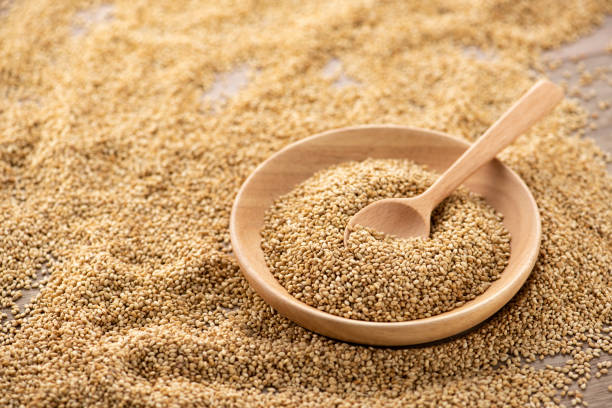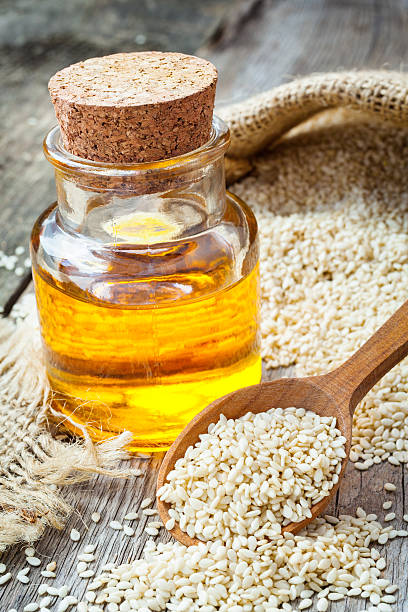Sesame seed has always been valued for its myriad health benefits and culinary versatility . This tiny seed, native to Africa and India, has captivated the tastes of people around the world. It has become an indispensable component in various culinary traditions. But what makes sesame seeds so special? Join us to find out!
Sesame Seed Nutritional Composition
Sesame seed is an excellent source of essential nutrients for the human body. Here we detail its nutritional composition, which makes it an exceptionally nutritious and versatile food:
Healthy fats: Sesame is rich in healthy fats, especially unsaturated fatty acids such as oleic acid (omega-9) and linoleic acid (omega-6). These fats are essential for cardiovascular health and proper functioning of the nervous system.
High-quality protein: Sesame seeds contain a good amount of protein. This makes them a valuable option for those seeking alternative sources of protein. These proteins are rich in essential amino acids, necessary for tissue synthesis and muscle maintenance.
Minerals:
- Calcium: Sesame is one of the best vegetable sources of calcium, an essential mineral for bone and dental health.
- Iron: Sesame is rich in iron, which is necessary for hemoglobin formation and oxygen transport in the body.
- Magnesium: This essential mineral is present in significant amounts in sesame seeds and plays a key role in muscle, nerve and cardiovascular function.
Fiber: Sesame is a good source of dietary fiber, both soluble and insoluble. Fiber is crucial for digestive health, as it helps maintain bowel regularity and prevents constipation. In addition, soluble fiber helps control blood glucose and cholesterol levels.
Vitamins: Vitamin E: Sesame is rich in vitamin E, an antioxidant that protects cells from damage caused by free radicals. This contributes to healthy skin and immune system.
Other nutrients:
Phytonutrients: these seeds contain phytonutrients such as lignans, with antioxidant properties and can positively affect hormonal and cardiovascular health.
Phytosterols: These plant compounds are similar to cholesterol and may help reduce LDL cholesterol levels in the blood.
The nutritional composition of sesame seed makes it a food with health benefits ranging from bone strengthening to cardiovascular protection and improved digestion. Incorporating sesame into your daily diet can be a delicious and easy way to improve overall health.

Therapeutic Properties of Sesame Seed
Sesame is not only delicious, it is also a treasure trove of therapeutic properties! It has been shown that its regular consumption can help reduce LDL ("bad") cholesterol and triglycerides, thus reducing the risk of cardiovascular disease. In addition, thanks to its content of antioxidants such as vitamin E and lignans, sesame helps fight oxidative stress and prevent premature aging.
But to learn more about this seed, we provide more detail about all its properties that make it a highly beneficial food for health:

Cholesterol reduction: Sesame contains lignans and phytosterols, plant compounds that have been shown to have beneficial effects in reducing LDL ("bad") cholesterol levels in the blood, which helps protect against cardiovascular disease.
Antioxidant properties: Thanks to its vitamin E content and other antioxidants, such as lignans, sesame helps fight oxidative stress, neutralizing free radicals and protecting cells from damage caused by them.
Bone health: Sesame is an excellent source of calcium, an essential mineral for bone and dental health . Incorporating sesame seeds into the diet can help prevent osteoporosis and strengthen bones.
Blood glucose control: The fiber present in sesame, along with its healthy fat content, can help stabilize blood sugar levels, which is beneficial for people with diabetes or to prevent insulin resistance.
Anti-inflammatory properties: Some studies suggest that the omega-6 fatty acids present in sesame may have anti-inflammatory properties, which may be beneficial in reducing inflammation in the body and helping to control chronic inflammatory diseases.
Cardiovascular health: In addition to lowering LDL cholesterol, sesame can help improve cardiovascular health in other ways. For example, by lowering triglycerides and promoting healthy blood vessels due to its unsaturated fatty acid content.
Digestive health: The dietary fiber present in sesame helps maintain bowel regularity, prevent constipation and promote healthy digestion, which contributes to the overall well-being of the digestive system.
How to Consume Sesame Seed?
Sesame is consumed in various ways in the kitchen. Either toasted or powdered on salads and vegetable dishes. It is the main ingredient in the preparation of tahini (sesame paste) and is also consumed as a decoration in breads and desserts, adding a touch of flavor and texture to any recipe. It can also be found in the form of oil, used both in cooking and cosmetics.
Uses of Sesame in the Food Industry
Sesame's versatility makes it an indispensable ingredient in the food industry. It is used in the production of a wide range of products, from breads and crackers to sauces and dressings. In addition, sesame oil is used in the manufacture of baked goods, fried foods and dressings. In this way it adds a delicious aroma and flavor to dishes.
However, in the cosmetics industry, sesame not only benefits our body on the inside, but also on the outside. Sesame oil is used in the production of moisturizers, body lotions and hair care products. Its emollient and antioxidant properties help keep the skin supple, soft and also protected against environmental damage.
Curiosities about Sesame Seeds
Did you know that sesame is one of the first plants cultivated by humans? Evidence of its cultivation has been found more than 5000 years ago! Furthermore, sesame is a self-pollinating plant, it can pollinate itself, facilitating its cultivation in different regions of the world.
So sesame seed is much more than just an ingredient in your kitchen. It has an impressive nutritional profile and a wealth of therapeutic properties. Its uses in the food and cosmetic industry have placed it in a prominent place in our daily lives, so when you see these tiny seeds, remember all the benefits they can bring to your health and well-being!
You can find sesame in Qomer's product catalog, where you can learn more about this product. And if you need more information, do not hesitate to contact us.




